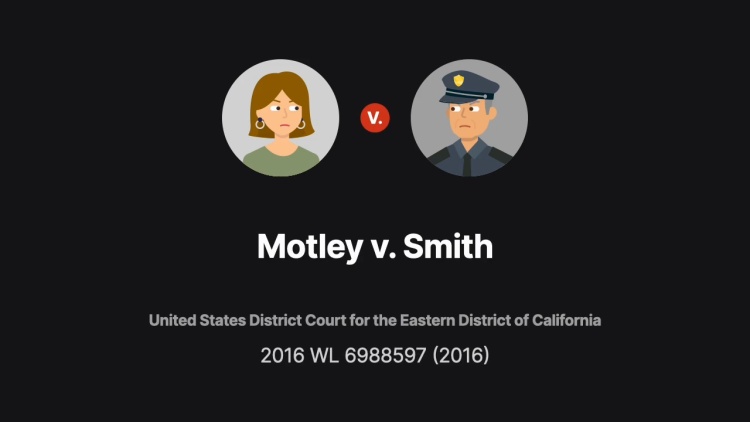Motley v. Smith
United States District Court for the Eastern District of California
2016 WL 6988597 (2016)
- Written by Haley Gintis, JD
Facts
In 2014 Cindy Raygoza (plaintiff) called the Fresno Police Department (the department) (defendant) after her boyfriend assaulted her. Pamela Motley (plaintiff) also called the department multiple times to inform them that her estranged husband was violating the restraining order she had obtained. Motley’s husband was unaware of the order. Officers from the department made sexist remarks to Raygoza and Motley and did not provide help. The officers also failed to provide Raygoza and Motley with information on their right to effectuate a citizen’s arrest, despite being required to do so under California Penal Code § 836(b). On April 12, 2014, Motley was shot by her estranged husband. Motley survived but sustained severe injuries, which left her quadriplegic and partially blind. On July 14, 2014, Raygoza was stabbed to death by her boyfriend. Motley and the representative of Raygoza’s estate (collectively, the victims) filed claims in federal district court against the city of Fresno and multiple officers within the department (collectively, the city) (defendants). After amending the original complaint, the victims claimed that the city had violated their constitutional rights and acted negligently. The court dismissed the complaint because the victims had failed to adequately establish their claims. The victims then filed a second amended complaint, which included gender-based equal-protection violation, failure to arrest, failure to protect, and failure to provide information claims.
Rule of Law
Issue
Holding and Reasoning (Drozd, J.)
What to do next…
Here's why 907,000 law students have relied on our case briefs:
- Written by law professors and practitioners, not other law students. 47,100 briefs, keyed to 996 casebooks. Top-notch customer support.
- The right amount of information, includes the facts, issues, rule of law, holding and reasoning, and any concurrences and dissents.
- Access in your classes, works on your mobile and tablet. Massive library of related video lessons and high quality multiple-choice questions.
- Easy to use, uniform format for every case brief. Written in plain English, not in legalese. Our briefs summarize and simplify; they don’t just repeat the court’s language.






